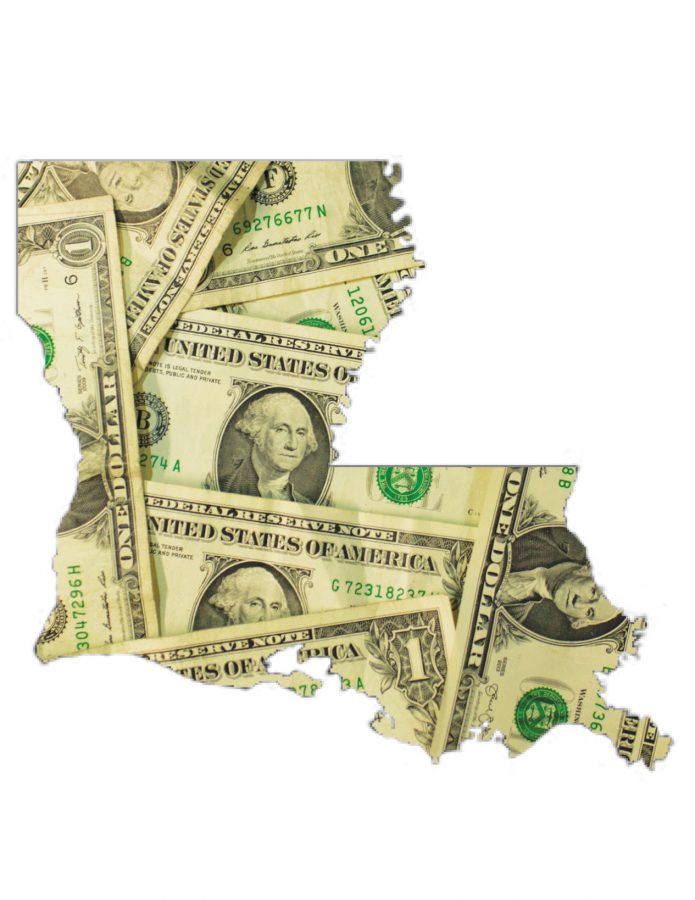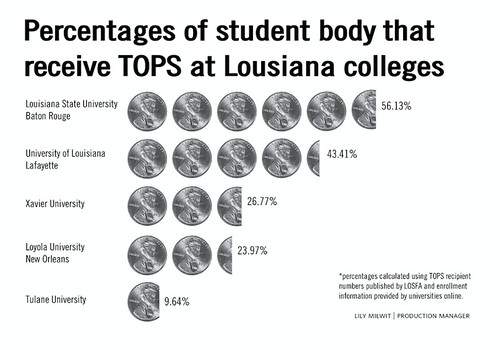TOPS bottoms out: 651 Tulane students risk losing scholarships
Louisiana residents attending college in their home state are now in fear of losing a significant part of financial aid after Governor John Bel Edward’s announcement Feb. 11.
Along with the rest of Louisiana higher education, these students are dealing with the implications of Edwards’ announcement that Louisiana will halt Taylor Opportunity Program for Students payments due to lack of funding unless substantial changes are made to the state budget. The next day, Edwards clarified that the Louisiana Office of Student Financial Assistance will fund 80 percent of TOPS payments this semester, and individual colleges and universities must absorb the remaining 20 percent. Next semester, TOPS is only 25 percent funded. According to the LOFSA, 651 Tulane students receive TOPS scholarships.
“Tulane University stands ready to cover any shortfall for the current 2016 spring semester in the worst case scenario that the State of Louisiana never fully pays TOPS awards for the current semester,” Tulane’s Associate Vice President of Financial Aid Michael Goodman said in an email interview. “If TOPS funding for future academic years is suspended, then this would mean that impacted students would need to seek alternative financing options.”
TOPS covers the cost of in-state tuition for Louisiana residents who meet certain academic requirements. The cost of in-state tuition is based off public institutions. Students attending private institutions, like Tulane, receive a scholarship equivalent to the weighted average of the scholarships given to students attending public institutions. This past year, Tulane students with TOPS scholarships received on average $5,771 and, for students who qualify, an annual stipend ranging from $200 to $800.
Students scoring a minimum ACT score of 17 or SAT score of 820 qualify for the TOPS’ first award, the TOPS Tech award. TOPS awards increase to the TOPS Honors award for students scoring an ACT score of 27 or SAT score of 1210. At Tulane, the average ACT score is 29 to 32.
“The extra money is really crucial for me and my family,” sophomore TOPS recipient Gabriella Mouriz, who is from Harvey, Louisiana, said. “My two brothers go to private school and one of my brothers is entering college next fall, so that money would be really helpful because they are going to have to pay for my brother in college and my brother in private school.”
According to Goodman, the university is working with the state “in anticipation of receiving the full amount of 2016 spring semester TOPS payments for ALL Tulane students who are eligible.” Any change in TOPS will not affect a student’s Tulane financial aid package, so in the event that students lose their TOPS scholarships, Tulane will not provide additional financial aid in the future.
“If Tulane determines that a student’s financial need is $10,000, we do not recognize that the student will [also] receive $5,771 from TOPS, [therefore] only offering $4,229 of Tulane scholarship,” Goodman said. “Instead, we would award the full $10,000 in Tulane scholarship to meet the student’s determined need, and allow the TOPS scholarship (or any other outside scholarship) to be “on top” or in addition to our level of support. Thus, when an outside scholarship is no longer received, it does not impact the level of funding that Tulane originally determined.”
Lily Milwit | Production Manager
Goodman said financial aid counseling staff will be available to assist students who could be effected by a change in TOPS funding find “alternate funding resources” to help replace the money they would have received from the state.
The state legislature is currently in a special session to address the budget crisis that is threatening TOPS. Edwards largely blames the previous administration’s mismanagement of the budget for the current crisis and calls for an increase in taxes to help cover costs. Legislators are discussing ideas such as increasing the academic standards to qualify for TOPS to an ACT score of 28.
While Tulane and other higher education institutions in Louisiana will cover students financially this semester, if any changes are made to TOPS they will not do the same next semester.
12.5 percent of Tulane undergraduate students come from Louisiana. Interim Director of Admission Jeff Schiffman said financial aid plays a big role in attracting new students, especially the university’s in-state constituency.
Schiffman said he is unsure of how any change to TOPS could impact the amount of Louisiana residents attending Tulane, but hopes it could create an opportunity for students to consider Tulane that would not have otherwise.
“You never know what will happen,” Schiffman said. “If they really do cut TOPS for some of our students that [would have been] on full TOPS at school like LSU, maybe there could opportunities for them to explore Tulane when they weren’t going to before because now there [are] scholarships for them here where there might not be at a school like LSU.”
Mouriz, who grew up in the New Orleans area and attended Ursuline Academy, said Tulane has been her dream school since the second grade, and can only attend the university because of her financial package. She believes, in light of the possible changes to TOPS, that Tulane should at least in part compensate for the money in-state students would have received from the program as way to invest in the local community.
“I committed to Tulane because I wanted to get back to New Orleans to give back to the city that gave so much to me,” Mouriz said. “Other students who are coming from out of town are going to end up going back to their states and contributing to their government and local state projects. … The local students, if they stay here for college, are most likely going to stay here for the long term. … These are students in your city, so how are you going to treat them?”
Your donation will support the student journalists of Tulane University. Your contribution will allow us to purchase equipment and cover our annual website hosting costs.




